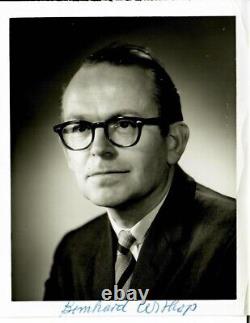
- Homepage
- Industry
- Object
- Profession
- Signed
- Signed By
- A Star (12)
- Al Pacino (7)
- Angelina Jolie (4)
- Artist Ms (11)
- Barack Obama (5)
- Betty White (5)
- Billy Wirth (5)
- Carrie Fisher (20)
- Dalai Lama (5)
- Donald Trump (30)
- Hong Eunchae (5)
- Jimmy Carter (5)
- Mike Trout (8)
- Roman Polanski (5)
- Shohei Ohtani (9)
- Stan Lee (7)
- Stephen Curry (5)
- Taylor Swift (5)
- Tom Brady (5)
- Tom Hardy (6)
- Other (4130)
- Type
RARE! NIH Shift Bernhard Witkop Hand Signed 4X5 B&W Photo



"Organic Chemist" Bernhard Witkop Hand Signed 4X5 B&W Photo. Witkop - along with his recruit, the late Dr. A term describing the movement. Oxidation, a process key in developing many therapies. He also helped to develop selective methods for. The non-enzymatic cleavage of proteins, which enabled the sequencing of. A method later used in the production of. Witkop also helped pioneer the NIH Visiting. Among other foreign scientists, he began attracting visiting. Researchers to the program from Japan as early as 1955. To Japan, where he gave talks in classical Japanese. Bestowed by the Emperor of Japan.
Brought in the first visiting fellow from Japan at a time when we were still in. The shadow of World War II, said Dr. Kenneth Jacobson, Chief of the NIDDK.
Many, included election to the. (1999) as well as the. Long after most lights at NIH darkened, Dr. Witkop might still be found working.Thomas Witkop remembers going to visit his father at his West. Virginia cabin one evening, and finding all signs that his father was present.
He came rolling back up to the. Apparently, he was at the cabin, had some big idea and drove to the lab. At NIH in the middle of the night, did whatever he needed to do, and then came. Witkop served as head of the NIDDK Laboratory of Chemistry for 30.
He was appointed an NIH Institute Scholar in 1987 and a Scholar Emeritus. Witkop's early career coincided with World War II. And Jewish on his mother's side, he gave much of the credit for his shelter. From the Nazis to his mentor at the. After a few years at Harvard University, Dr. Witkop came to NIH as a fellow in the. Father's NIH service was a high point of his life. In addition to his son, Dr. Witkop is survived by his wife of 65 years, Marlene Prinz Witkop; daughters. Cornelia Hess and Phyllis Kasper; a sister; and seven grandchildren.
